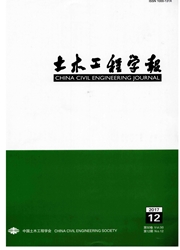

 中文摘要:
中文摘要:
为了进一步论证应用电阻率法检测水泥土搅拌桩施工质量的可行性,以现场钻取的水泥土芯样为研究对象,进行了不同交流电频率下的电阻率、无侧限抗压强度和渗透试验。结果表明:电阻率随电流频率的增加而减小,根据电阻率的变化趋势可以发现存在一个临界频率50kHz;水泥土电阻率和无侧限抗压强度均随土层的变化呈现一致的变化规律,但是水泥土电阻率和渗透系数均随土层的变化呈现相反的变化规律;水泥土无侧限抗压强度和电阻率、渗透系数和电阻率、变形模量和无侧限抗压强度之间均呈较好的线性关系;建立了可以通过水泥土电阻率估计其无侧限抗压强度、变形模量和渗透系数的关系式。研究结果可为现场检测水泥土施工质量提供参考。
 英文摘要:
英文摘要:
In order to further demonstrate the application of electrical resistivity method to detecting the quality of soil- cement mixing piles, the soil-cement core samples taken from site were studied and tested. Based on the tests of core samples for the electrical resistivity under different alternating current frequencies, unconfined compressive strength and permeability, it is found that the electrical resistivity may decrease with the increase of current frequency, and there exists a critical frequency of 50kHz during the variation of electrical resistivity; with the changing of soil layer, both electrical resistivity and unconfined compressive strength have similar variation laws, but the electrical resistivity and the permeability coefficient have opposite variations with soil layer; good linear relationships between unconfined compressive strength and electrical resistivity, between coefficient of permeability and electrical resistivity, or between deformation modulus and unconfined compressive strength can be observed. Furthermore, the formulas for determining unconfined compressive strength, deformation modulus and coefficient of permeability according to electrical resistivity were established. The research results and conclusions can be referred when detecting the quality of soil-cement mixing piles in site.
 同期刊论文项目
同期刊论文项目
 同项目期刊论文
同项目期刊论文
 期刊信息
期刊信息
